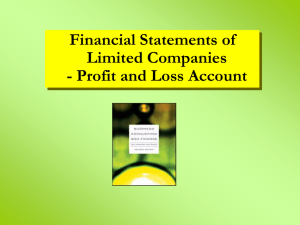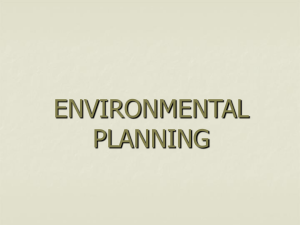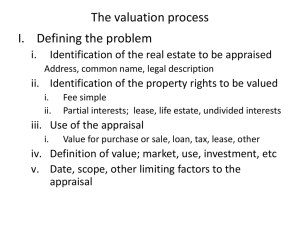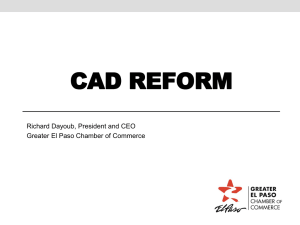International Valuation Standards Council (IVSC)
advertisement
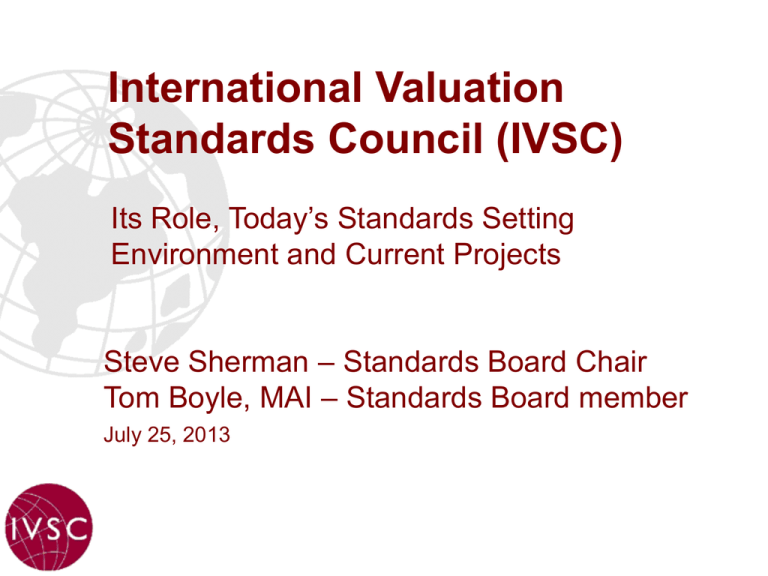
International Valuation Standards Council (IVSC) Its Role, Today’s Standards Setting Environment and Current Projects Steve Sherman – Standards Board Chair Tom Boyle, MAI – Standards Board member July 25, 2013 Disclaimer The views expressed at this conference and in any accompanying document are the personal views of the presenters and do not necessarily represent those of the IVSC Boards. Standards and Guidance are only issued by the Boards after following a process of public consultation and open deliberation. 2 Today’s Agenda IVSC Overview International Valuation Standards Overview Current Environment for Valuation Standards Current Projects 3 International Valuation Standards Council Overview 4 IVSC Website The IVSC – Objectives • Develop high quality international standards and support their adoption and use; • Facilitate collaboration and cooperation among its member bodies; • Collaborate and cooperate with other international organisations; • Serve as the international voice for the valuation profession. 6 The IVSC’s Authority Comes From: • Consulting with valuation users and regulators to identify their concerns; • Working with professional valuers to identify solutions; and • Developing and promoting those solutions. Enforcement of and compliance with IVS is by those adopting the standards, e.g. regulators, professional bodies, clients. 7 The IVSC – Structure Board of Trustees: Strategy, Governance and Fund-raising Standards Board: Professional Board: Standards and Technical Guidance Development and Promotion of the Valuation Profession 8 IVSC – Board of Trustees Chairman – Sir David Tweedie 2001, elected first Chairman of International Accounting Standards Board (served 10 yrs) In 2001, only a handful of countries used international standards (IFRS) but by 2011 over 120 countries required or permitted their use Former member of the Financial Stability Board Fellow of the Judge Business School at Cambridge University Knighted in 1994 President of The Institute of Chartered Accountants of Scotland for 2012-13. Chairs the Royal Household Audit Committee for the Sovereign Grant 9 Board of Trustees (continued) • • • • • • • • • • • • Patrick Gounelle (France), Vice Chair Nicolas Brooke (Hong Kong) Roel Campos (U.S.A) Brad Dalglish (Canada) Lee Hackett (U.S.A.) Madame Ping Lui (China) Malcolm Knight (Canada/U.S.A.) April Mackenzie (New Zealand) Jens Roder (Denmark) John Smith (U.S.A.) Frank Vettese (Canada) Akihiro Watanabe (Japan) 10 Members – Valuation Professional Organizations n n n n n n n n n n Australia, Belarus, Bosnia and Herzegovina, Botswana Brazil, Bulgaria Canada, China, Colombia, Croatia Egypt, Finland Georgia, Greece Hong Kong, India, Indonesia Ireland, Italy Japan n n n n n n n n n n n n n Kazakhstan, Kenya, Korea Latvia, Lithuania Malawi, Malaysia, Mexico Namibia, The Netherlands New Zealand, Norway, Nigeria Philippines, Poland Romania, Russia Serbia, Slovenia, South Africa Spain, Sweden Thailand Ukraine United Kingdom United States of America 11 Valuation Professional Organizations Advisory Forum American Society of Appraisers Appraisal Institute Appraisal Institute of Canada Asociación Profesional de Sociadades de Valoración (ATASA) Australian Property Institute Canadian Institute of Chartered Business Valuators Hong Kong Institute of Surveyors Royal Institute of Chartered Surveyors The Appraisal Foundation 12 International Valuation Standards Overview 13 Appraisal Institute: Preamble to Code of Professional Ethics (effective July 1, 2006) 14 Objectives of the International Valuation Standards PROTECT THE PUBLIC INTEREST (i.e., investors, taxpayers) Promote consistency of approaches Position valuers to perform high quality work Develop common terminology Establish a framework for delivering valuations Provide transparency 15 History IVSC published first definitions and standards in early 1990s In 2000 first comprehensive book of standards published – four subsequent editions to 2007 By 2007 had grown to book of over 450 pages but the detail was presenting obstacles to wider adoption 16 IVS Improvements Project Guiding principles for rewrite: Make general principles “asset neutral” Identify principles that could be applied globally Exclude terms and practices only found in certain market or countries Distinguish rules from discussion and guidance Keep language simple Avoid jargon and unnecessary definitions Avoid repetition 17 IVS Revision Process Market factors beginning in 2008 were catalysts for this project 52 comment letters received and reviewed Three global roundtables held in 2010 (NY, Hong Kong, London) 18 IVS Board Approved in March 2011 Published July 2011 Effective January 1, 2012 May be purchased from IVSC online, (£40) IVSonline: www.ivsc.org/products Technical Information Papers (TIPs) available separately 19 IVSonline – subscription service 20 IVS Structure IVS Definitions IVS Framework 11 Standards (standards & guidance): 3 General Standards 6 Asset Standards 2 Application Standards Technical Information Papers (TIPS): DCF Cost Approach for Tangible Assets Valuation of Intangible Assets 21 Accessible from the AI Website 22 The IVSC’s Standard Setting Process • Needs are identified through research and public consultation • Proposed standards are debated at open board meetings • Comments are solicited through a public exposure process • New and revised standards are periodically published and posted on the IVSC’s website 23 IVSC Standards Board Steve Sherman, (U.S.A.) Chair. BV Frank Bollman, (Germany) Vice Chair. BV Thomas Boyle (U.S.A.), Real Property Ana Castaneda (Spain), Financial Instruments Jim Eales (United Kingdom), BV Paul Hawkes (Switzerland) Financial Instruments Simon Landy (Thailand), Real Property Dr. Cindy Ma (U.S.A.), Financial Instruments Chris Stanley (New Zealand), Real Property 24 Current Environment for Valuation Standards 25 What Do Others Think? • G20 – in 2009 recognised valuation as being a contributory factor to the financial crisis… • …but asked accountants (IASB) to fix it! • Scepticism around fair value measurements under IFRS • SEC comments 2005 and 2011 26 Comments from the SEC (from Dec 2011) “The broadening application of fair value …and the 2008 financial crisis have cast the spotlight on valuation professionals. At last count, valuation professionals in the US can choose among five business valuation credentials available from four different organizations, each with its own set of criteria for attainment…... Risks created by the differences in valuation credentials that exist today range from the seemingly innocuous concerns of market confusion ….to the more overt concerns of objectivity of the valuator and analytical inconsistency.” 27 Comments from the SEC (continued) “One potential solution to consider is whether there should be, similar to other professions, a single set of qualifications with respect to education level and work experience, a continuing education curriculum, standards of practice and ethics, and a code of conduct. One could also contemplate whether a comprehensive inspection program and a fair disciplinary mechanism should be established to encourage proper behavior and enforce the rules of the profession in the public interest.” est.” 28 Restatements of US Public Companies Over 50% of restatements in certain years may have involved FV measurements Nearly one-third of Goodwill written off in 2008/09 (over $700B) Regulatory reviews: greater focus on audit evidence supporting FV measurements 29 PCAOB 2009/10 Inspection Reports: Fair Value Deficiencies Breakdown of Deficiencies by Topic Area in 2009: Financial Instruments Inspections of the Big 4 in 2009 resulted in 37 audits containing a “deficiency” Of these, 26 (70%) involved fair value measurements 11 Goodwill and Intangible Asset Impairment 8 Long-Lived Asset Impairment Analysis 3 54/77 in 2010 = 70% Inventory Valuation 2 Other 2 Foreign regulators increasingly in contact with the PCAOB Total 26 30 IVSC Speaking for Global Profession Good relationships with other private sector standard setters in financial markets, eg: IASB, FASB IFAC IPEV One of nine bodies invited to give joint recommendations to G20 on how private sector can contribute to better financial regulation. Interaction with financial regulators, eg: FSB, IOSCO SEC, PCAOB, 31 Adoption of the IVSs Adopted as national standards in many countries (e.g. Australia, New Zealand, Romania, South Africa, Turkey) Some countries have adopted as national standards with amendments to meet requirements of national legislation. Professional organisations adopting IVS: AI RICS ASA (non-US reports) On going IVS Adoption efforts. 32 IVS – Current Projects 33 Updating and Clarification of Standards In June 2013, the Standards Board approved minor amendments to the 2011 Standards: Clarifying applicability to valuation reviews Clarifying valuers’ duty to investigate and when information provided by others may be relied upon More explicit encouragement of using multiple methods to cross check Amendments approved by Board in June 2013 New standards will be effective from 1 January 2014 34 IVSC Technical Projects Equity Derivatives – Exposure Draft published July 2013 Credit and Debit Valuation adjustments – Exposure Draft expected fall 2013. Valuation Uncertainty – Comments received on Exposure Draft; TIP in development. Commercial Forestry – Further research due to diversity revealed by responses to Exposure Draft. Extractive Industries: Comments on 2012 Discussion Paper being analysed. Trade Related Property: Exposure Draft received few comments. Issue being evaluated. 35 IVSC Technical Projects - Continued Investment Property: Discussion Paper published November 2012 – comments being analysed Liabilities: Comments on 2012 Discussion Paper being analysed Specialised Public Service Assets: Review comment letters on the proposed TIP. 36 IVSC Professional Development Projects Audit Guidance for Valuers: Revising following comments on 2012 Exposure Draft. Professional Valuer Competencies: Expanding the basic Competency Framework published in 2012. Regulatory Convergence: Paper aimed at promoting role that better valuation standards can play in improving the global regulation of the financial sector. s. Illustrative Examples Exposure Draft due Q3 2013 37 International Valuation Standards Council Thank you for your attention! Questions? 38
